外研版(2019)必修 第二册Unit 1 Food for thought Developing ideas课件(共32张PPT)
文档属性
| 名称 | 外研版(2019)必修 第二册Unit 1 Food for thought Developing ideas课件(共32张PPT) | 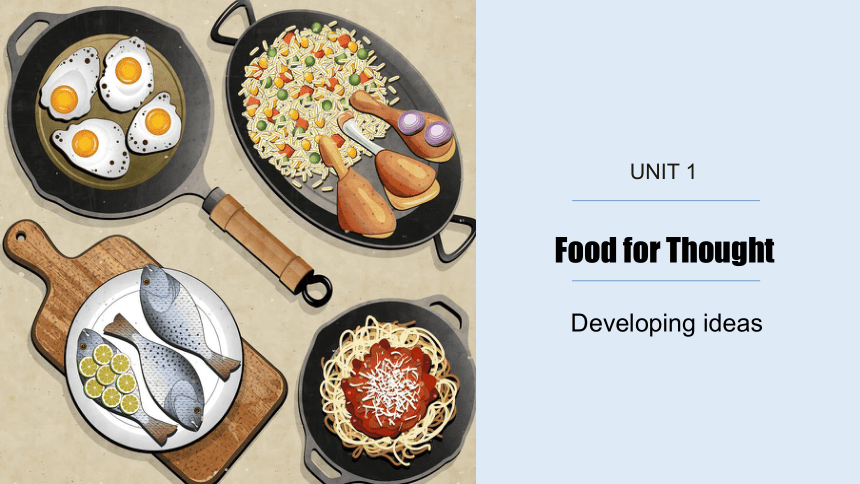 | |
| 格式 | pptx | ||
| 文件大小 | 2.3MB | ||
| 资源类型 | 教案 | ||
| 版本资源 | 外研版(2019) | ||
| 科目 | 英语 | ||
| 更新时间 | 2023-10-30 17:50:26 | ||
图片预览



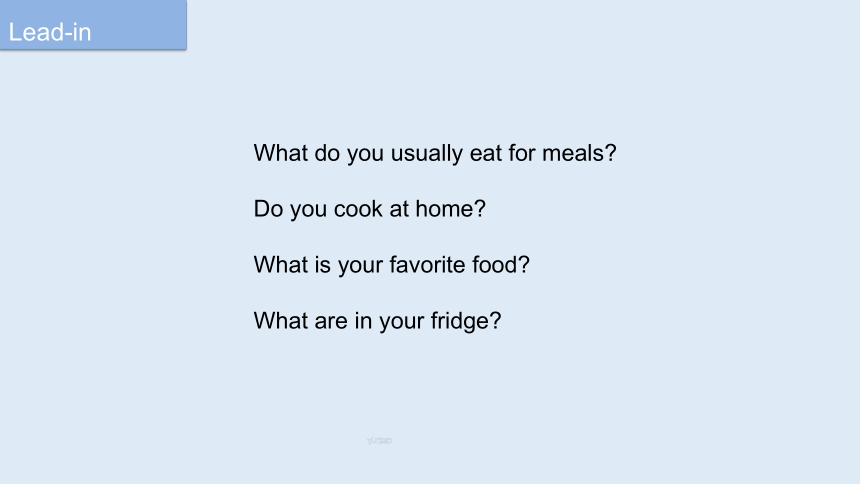
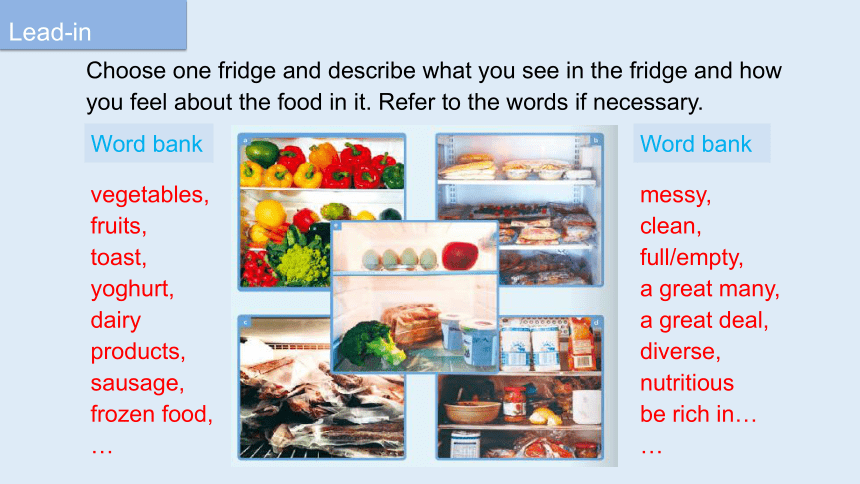

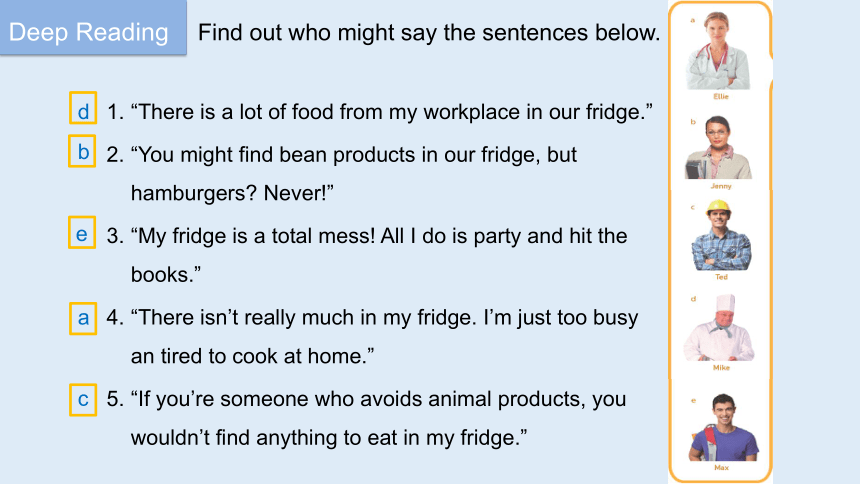
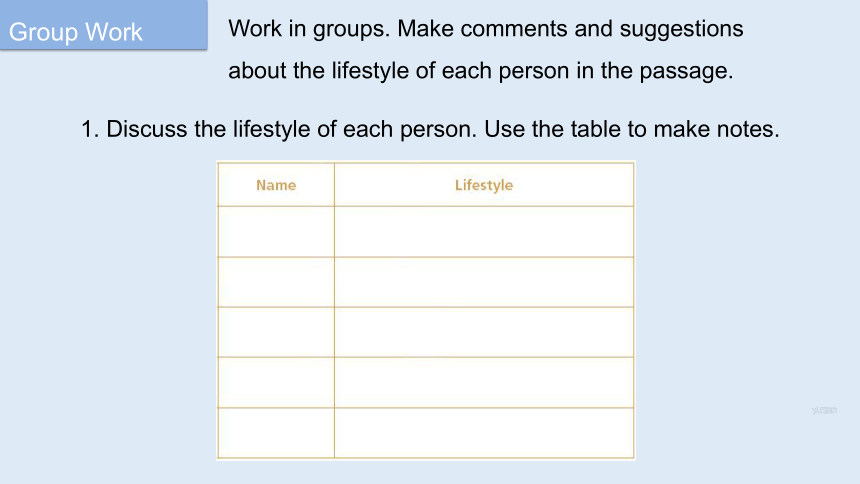
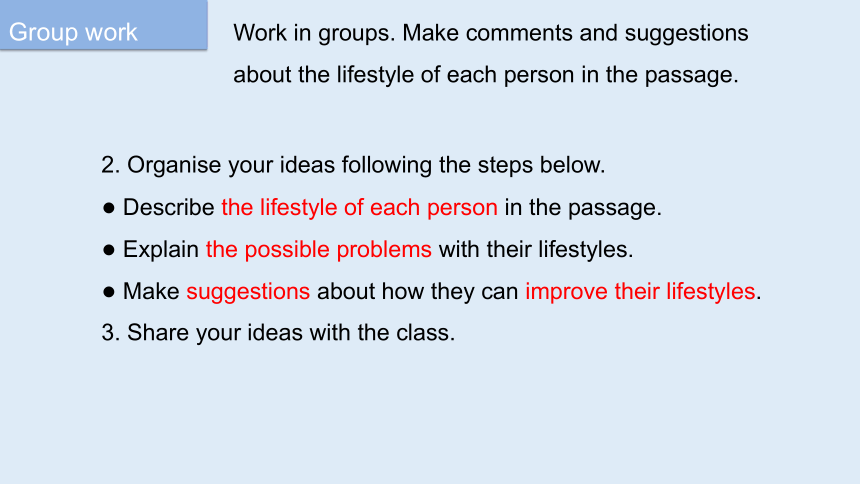
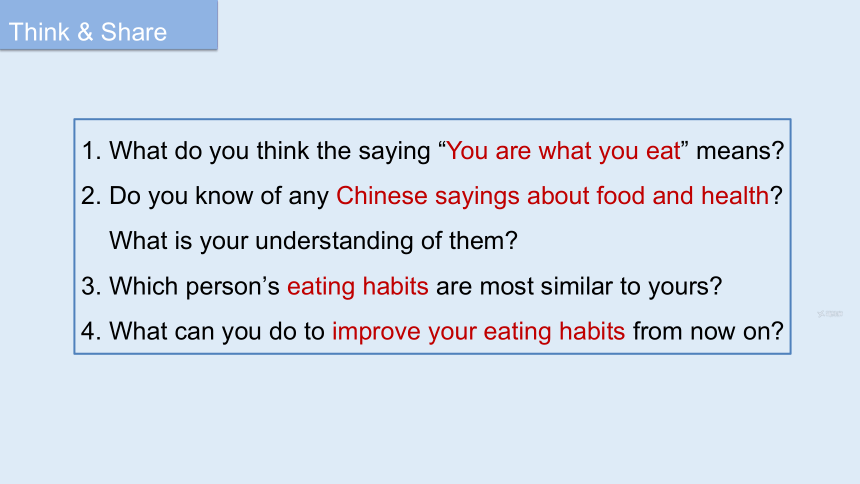
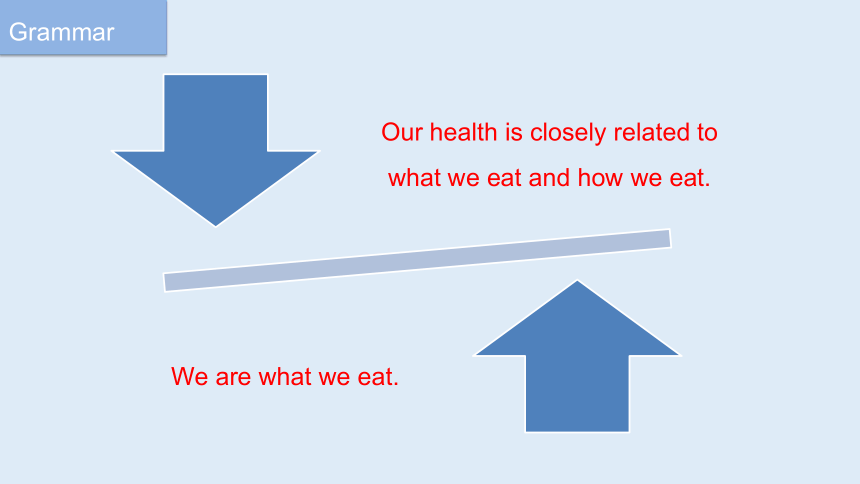
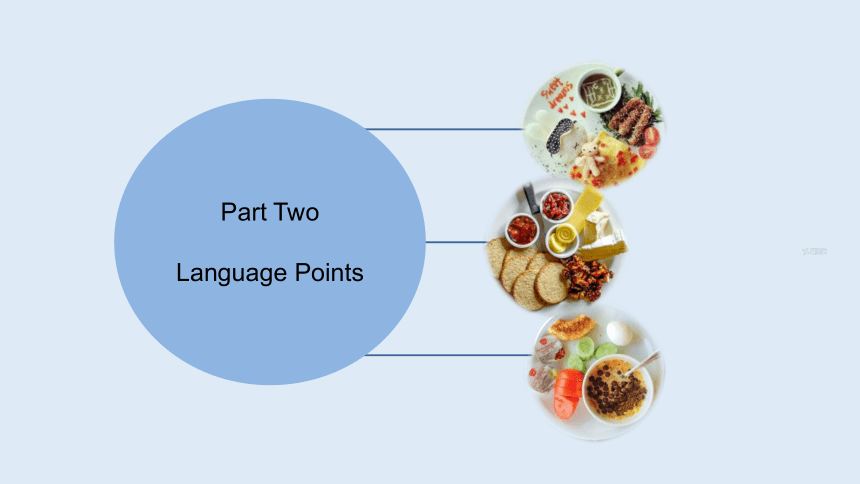
文档简介
(共32张PPT)
Developing ideas
UNIT 1
Food for Thought
Learning Aims
To read and grasp the main idea of the passage.
To get the detailed information of the passage.
To deal with the words and expressions.
To deal with the sentence patterns.
Part One
Comprehension
Lead-in
What do you usually eat for meals
Do you cook at home
What is your favorite food
What are in your fridge
Lead-in
vegetables,
fruits,
toast,
yoghurt,
dairy
products,
sausage,
frozen food,
…
Word bank
Word bank
messy,
clean,
full/empty,
a great many,
a great deal,
diverse,
nutritious
be rich in…
…
Choose one fridge and describe what you see in the fridge and how you feel about the food in it. Refer to the words if necessary.
Fast Reading
Read the passage and match the pictures of the fridges to their owners.
Deep Reading
Find out who might say the sentences below.
“There is a lot of food from my workplace in our fridge.”
“You might find bean products in our fridge, but hamburgers Never!”
“My fridge is a total mess! All I do is party and hit the books.”
“There isn’t really much in my fridge. I’m just too busy an tired to cook at home.”
“If you’re someone who avoids animal products, you wouldn’t find anything to eat in my fridge.”
d
b
c
a
e
Group Work
Work in groups. Make comments and suggestions about the lifestyle of each person in the passage.
1. Discuss the lifestyle of each person. Use the table to make notes.
Group work
Work in groups. Make comments and suggestions about the lifestyle of each person in the passage.
2. Organise your ideas following the steps below.
● Describe the lifestyle of each person in the passage.
● Explain the possible problems with their lifestyles.
● Make suggestions about how they can improve their lifestyles.
3. Share your ideas with the class.
Think & Share
1. What do you think the saying “You are what you eat” means
2. Do you know of any Chinese sayings about food and health
What is your understanding of them
3. Which person’s eating habits are most similar to yours
4. What can you do to improve your eating habits from now on
Grammar
Part Two
Language Points
1. _________ n. 生活方式
2. _________ v. 属于
3. _________ v. (使) (前后)摆动,(使)摇摆 → _________ pt./p.p
4. _________ n. 蜂蜜
5. ____________ n. 建造,建筑 → __________ v. 建造,建筑
lifestyle
belong
swing
honey
Words
construction
swung
construct
6. _________ adj. 令人高兴的,令人满意的→ ________ adj. 满意的,高兴的 → _______ v. 使满足,使满意 → ___________ n. 满足,满意
7. ___________ adj. 自制的,家里做的
8. ___________ adj. 方便的,便利的→ ____________ n. 方便,便利
9. _______ n. 厨师
10._________ v. 确定,发现 → _________ n. 身份,本体,特征
satisfying
satisfied
satisfy
satisfaction
Words
homemade
convenient
convenience
chef
identify
identity
1. __________ 属于
2. ____________________________ 空间极其窄小
3. ________(尤指经历一系列意外后)最终处于
4. _________ 打听(不在时所发生的事情)
5. _________ 抚养,养育
6. __________________ 建筑工地
7. ____________ 或多或少
8.________________ 忙于做某事
9. ________ 有点儿
belong to
end up
catch up
bring up
not enough room to swing a cat
the construction site
Phrases
more or less
be busy doing sth.
kind of
Key Words
construction n.[U]建造,建筑;[C]建筑物
建筑工人
在建造中
a construction worker
under construction
【归纳拓展】
“under + n.” 常表示正在进行的动作,而且包含被动含义,相当于进行时的被动语态。
under repair 在修理中
under consideration 在考虑中
under treatment 在治疗中
under discussion 在讨论中
Key Words
单句语法填空
Young people should make a contribution to the ___________(construct)
of their motherland.
(2) This new hospital is currently ________ construction.
完成句子
(3) The possibility of employing more workers is still
_____________________________(在讨论中).
construction
under
under discussion/being discussed
Key Words
2. satisfying adj. 令人高兴的,令人满意的 satisfy vt. 使满意
satisfied adj. 满意的,满足的 satisfaction n. 满意,满足
对……感到满意
满足某人的需求
满意地
使某人满意的是
be satisfied with
satisfy one’s need(s)
with satisfaction
to one’s satisfaction
Key Words
单句语法填空
(1) The young boy gave a __________(satisfy) answer to his teacher.
(2) From his _________(satisfy) look, I know everything is going well.
(3) Having rid the company of the heavy debts, the manager smiled with
___________(satisfy).
(4) Satisfied ______ his students’ achievements, the professor praised
them several times.
(5) _____ the mother’s satisfaction, her son made great progress.
satisfying
satisfied
satisfaction
with
To
Key Words
3. convenient adj. 方便的,便利的 convenience n. 方便,便利
对某人来说是方便的
对某人来说做某事是方便的
为了方便起见
在某人方便时
be convenient for sb.
It is convenient for sb. to do sth.
for convenience
at one’s convenience
【特别提示】
convenient 不能用人作主语,可用事物作主语或用 it 作形式主语。
Key Words
单句语法填空
(1) The meeting will be held on Thursday when it is convenient ____ everyone.
(2) It is convenient for you ________(take) buy everything you need in life here.
(3) There is no doubt that the Internet makes our life __________(convenience).
(4) Most of us like the ___________(convenient) of using credit cards to buy necessities.
(5) These meals can be prepared in advance, and served _____ your convenience.
for
to take
convenient
convenience
at
Key Phases
1. belong to 属于
【特别提示】
(1) belong to 既不用于被动语态,也不用于进行时态。
(2)可用 belong to 的现在分词形式作后置定语。
判断正误
This pen belongs to me.( )
This pen is belonged to me.( )
This pen is belonging to me.( )
√
×
×
Key Phrases
单句语法填空
(1) It’s well-known that tigers belong _____ the cat family.
(2) Put your name in your coat so we can see who it _________(belong) to.
(3) The old house ___________(belong) to my grandfather was still in good
condition.
(4) He took away the suitcase not ___________(belong) to him on purpose.
(7) It’s important to have a sense of __________(belong).
belonging
belongs
belonging
to
belonging
Key Phrases
2. end up (尤指经历一系列意外后)最终处于,到头来
end up doing sth. 以做某事而告终
end up with 以……结束(后接表具体事物的名词)
end up in 以……结束(后接表抽象概念的名词及地点名词)
end up as 最终成为……(后接表职位或身份的名词)
end in 以……结束/告终(多指不好的结局)
Key Phrases
单句语法填空
We planned to fly to Beijing but ended up _________(spend) a whole night
at the airport.
(2) You will end up ____ prison if you keep on doing like that.
(3) He started out to study French, but end up _____ an English translator.
(4) The closing ceremony ended up _______ an 8-minute show.
(5) His experiment ended up ______ failure but he didn’t lose heart.
spending
in
as
with
in
Key Phrases
3. bring up 养育,抚养;提起(某个话题);呕吐
bring about 引起,导致
bring back 带回;使回忆起;恢复
bring down 降低,减少
bring in 引进,赚得,带来
bring out 使显现,使清楚,取出,带出
bring forward 提出,提议
Key Phrases
(1) Born into a family with three brothers, David was brought ______ to
value the sense of sharing.
(2) Working with the medical team in Africa has brought ______ the best in
her as a doctor.
(3) Her carelessness brought ______ the terrifying accident.
(5) I have three part-time jobs, which bring _____ about $ 14,000 a year.
(6) The aim of the research is to study and bring ________ suggestions on
language learning.
up
out
about
in
forward
单句语法填空
Sentence Patterns
1. …, there is nothing more satisfying than a big meat dinner.
句式分析
“否定词+ 比较级”意为“不比……更,最……不过”,表示最高级意义。
常用于此结构中的否定词有no, not, never, nothing等。
单句语法填空
The film is horrible. It couldn’t be any ________(bad).
How beautifully she sings! I have never heard a _______(good) voice.
完成句子
(3) 我十分赞同你的意见。
worse
better
I couldn’t agree with you more.
Sentence Patterns
2. There are five of us living in our shared student house.
句式分析
“There be+ 主语 + 非谓语动词”句式中,非谓语动词作后置定语,修饰主语。
句式总结
(1) There be+ 主语 +doing (表示主动和进行)
(2) There be+ 主语 + done (表示被动或完成)
(3) There be+ 主语 + to do (表示动作尚未发生)
Sentence Patterns
【特别提示】
当主语与其后的不定式是被动关系时,不定式用主动语态和被动语态均可,有些没有意义上的区别,有些则有区别。
There is no time to lose/to be lost. 时间不容耽搁。
There is nothing to see. 没有什么东西值得看。
There is nothing to be seen. 看不见什么东西。
Sentence Patterns
单句语法填空
(1) There are still millions of people _________(suffer) from hunger nowadays.
(2) I also grow wheat and vegetables so there are many things _________
(look) after.
(3) There is still some support ______(give) by the local people.
(4) There are still many problems __________________(solve)before we are
ready for a long stay on the Moon.
(5) There is only one more day ______(go) before your favorite music group
play live.
suffering
to look
given
to solve/to be solved
to go
Thank you!
Developing ideas
UNIT 1
Food for Thought
Learning Aims
To read and grasp the main idea of the passage.
To get the detailed information of the passage.
To deal with the words and expressions.
To deal with the sentence patterns.
Part One
Comprehension
Lead-in
What do you usually eat for meals
Do you cook at home
What is your favorite food
What are in your fridge
Lead-in
vegetables,
fruits,
toast,
yoghurt,
dairy
products,
sausage,
frozen food,
…
Word bank
Word bank
messy,
clean,
full/empty,
a great many,
a great deal,
diverse,
nutritious
be rich in…
…
Choose one fridge and describe what you see in the fridge and how you feel about the food in it. Refer to the words if necessary.
Fast Reading
Read the passage and match the pictures of the fridges to their owners.
Deep Reading
Find out who might say the sentences below.
“There is a lot of food from my workplace in our fridge.”
“You might find bean products in our fridge, but hamburgers Never!”
“My fridge is a total mess! All I do is party and hit the books.”
“There isn’t really much in my fridge. I’m just too busy an tired to cook at home.”
“If you’re someone who avoids animal products, you wouldn’t find anything to eat in my fridge.”
d
b
c
a
e
Group Work
Work in groups. Make comments and suggestions about the lifestyle of each person in the passage.
1. Discuss the lifestyle of each person. Use the table to make notes.
Group work
Work in groups. Make comments and suggestions about the lifestyle of each person in the passage.
2. Organise your ideas following the steps below.
● Describe the lifestyle of each person in the passage.
● Explain the possible problems with their lifestyles.
● Make suggestions about how they can improve their lifestyles.
3. Share your ideas with the class.
Think & Share
1. What do you think the saying “You are what you eat” means
2. Do you know of any Chinese sayings about food and health
What is your understanding of them
3. Which person’s eating habits are most similar to yours
4. What can you do to improve your eating habits from now on
Grammar
Part Two
Language Points
1. _________ n. 生活方式
2. _________ v. 属于
3. _________ v. (使) (前后)摆动,(使)摇摆 → _________ pt./p.p
4. _________ n. 蜂蜜
5. ____________ n. 建造,建筑 → __________ v. 建造,建筑
lifestyle
belong
swing
honey
Words
construction
swung
construct
6. _________ adj. 令人高兴的,令人满意的→ ________ adj. 满意的,高兴的 → _______ v. 使满足,使满意 → ___________ n. 满足,满意
7. ___________ adj. 自制的,家里做的
8. ___________ adj. 方便的,便利的→ ____________ n. 方便,便利
9. _______ n. 厨师
10._________ v. 确定,发现 → _________ n. 身份,本体,特征
satisfying
satisfied
satisfy
satisfaction
Words
homemade
convenient
convenience
chef
identify
identity
1. __________ 属于
2. ____________________________ 空间极其窄小
3. ________(尤指经历一系列意外后)最终处于
4. _________ 打听(不在时所发生的事情)
5. _________ 抚养,养育
6. __________________ 建筑工地
7. ____________ 或多或少
8.________________ 忙于做某事
9. ________ 有点儿
belong to
end up
catch up
bring up
not enough room to swing a cat
the construction site
Phrases
more or less
be busy doing sth.
kind of
Key Words
construction n.[U]建造,建筑;[C]建筑物
建筑工人
在建造中
a construction worker
under construction
【归纳拓展】
“under + n.” 常表示正在进行的动作,而且包含被动含义,相当于进行时的被动语态。
under repair 在修理中
under consideration 在考虑中
under treatment 在治疗中
under discussion 在讨论中
Key Words
单句语法填空
Young people should make a contribution to the ___________(construct)
of their motherland.
(2) This new hospital is currently ________ construction.
完成句子
(3) The possibility of employing more workers is still
_____________________________(在讨论中).
construction
under
under discussion/being discussed
Key Words
2. satisfying adj. 令人高兴的,令人满意的 satisfy vt. 使满意
satisfied adj. 满意的,满足的 satisfaction n. 满意,满足
对……感到满意
满足某人的需求
满意地
使某人满意的是
be satisfied with
satisfy one’s need(s)
with satisfaction
to one’s satisfaction
Key Words
单句语法填空
(1) The young boy gave a __________(satisfy) answer to his teacher.
(2) From his _________(satisfy) look, I know everything is going well.
(3) Having rid the company of the heavy debts, the manager smiled with
___________(satisfy).
(4) Satisfied ______ his students’ achievements, the professor praised
them several times.
(5) _____ the mother’s satisfaction, her son made great progress.
satisfying
satisfied
satisfaction
with
To
Key Words
3. convenient adj. 方便的,便利的 convenience n. 方便,便利
对某人来说是方便的
对某人来说做某事是方便的
为了方便起见
在某人方便时
be convenient for sb.
It is convenient for sb. to do sth.
for convenience
at one’s convenience
【特别提示】
convenient 不能用人作主语,可用事物作主语或用 it 作形式主语。
Key Words
单句语法填空
(1) The meeting will be held on Thursday when it is convenient ____ everyone.
(2) It is convenient for you ________(take) buy everything you need in life here.
(3) There is no doubt that the Internet makes our life __________(convenience).
(4) Most of us like the ___________(convenient) of using credit cards to buy necessities.
(5) These meals can be prepared in advance, and served _____ your convenience.
for
to take
convenient
convenience
at
Key Phases
1. belong to 属于
【特别提示】
(1) belong to 既不用于被动语态,也不用于进行时态。
(2)可用 belong to 的现在分词形式作后置定语。
判断正误
This pen belongs to me.( )
This pen is belonged to me.( )
This pen is belonging to me.( )
√
×
×
Key Phrases
单句语法填空
(1) It’s well-known that tigers belong _____ the cat family.
(2) Put your name in your coat so we can see who it _________(belong) to.
(3) The old house ___________(belong) to my grandfather was still in good
condition.
(4) He took away the suitcase not ___________(belong) to him on purpose.
(7) It’s important to have a sense of __________(belong).
belonging
belongs
belonging
to
belonging
Key Phrases
2. end up (尤指经历一系列意外后)最终处于,到头来
end up doing sth. 以做某事而告终
end up with 以……结束(后接表具体事物的名词)
end up in 以……结束(后接表抽象概念的名词及地点名词)
end up as 最终成为……(后接表职位或身份的名词)
end in 以……结束/告终(多指不好的结局)
Key Phrases
单句语法填空
We planned to fly to Beijing but ended up _________(spend) a whole night
at the airport.
(2) You will end up ____ prison if you keep on doing like that.
(3) He started out to study French, but end up _____ an English translator.
(4) The closing ceremony ended up _______ an 8-minute show.
(5) His experiment ended up ______ failure but he didn’t lose heart.
spending
in
as
with
in
Key Phrases
3. bring up 养育,抚养;提起(某个话题);呕吐
bring about 引起,导致
bring back 带回;使回忆起;恢复
bring down 降低,减少
bring in 引进,赚得,带来
bring out 使显现,使清楚,取出,带出
bring forward 提出,提议
Key Phrases
(1) Born into a family with three brothers, David was brought ______ to
value the sense of sharing.
(2) Working with the medical team in Africa has brought ______ the best in
her as a doctor.
(3) Her carelessness brought ______ the terrifying accident.
(5) I have three part-time jobs, which bring _____ about $ 14,000 a year.
(6) The aim of the research is to study and bring ________ suggestions on
language learning.
up
out
about
in
forward
单句语法填空
Sentence Patterns
1. …, there is nothing more satisfying than a big meat dinner.
句式分析
“否定词+ 比较级”意为“不比……更,最……不过”,表示最高级意义。
常用于此结构中的否定词有no, not, never, nothing等。
单句语法填空
The film is horrible. It couldn’t be any ________(bad).
How beautifully she sings! I have never heard a _______(good) voice.
完成句子
(3) 我十分赞同你的意见。
worse
better
I couldn’t agree with you more.
Sentence Patterns
2. There are five of us living in our shared student house.
句式分析
“There be+ 主语 + 非谓语动词”句式中,非谓语动词作后置定语,修饰主语。
句式总结
(1) There be+ 主语 +doing (表示主动和进行)
(2) There be+ 主语 + done (表示被动或完成)
(3) There be+ 主语 + to do (表示动作尚未发生)
Sentence Patterns
【特别提示】
当主语与其后的不定式是被动关系时,不定式用主动语态和被动语态均可,有些没有意义上的区别,有些则有区别。
There is no time to lose/to be lost. 时间不容耽搁。
There is nothing to see. 没有什么东西值得看。
There is nothing to be seen. 看不见什么东西。
Sentence Patterns
单句语法填空
(1) There are still millions of people _________(suffer) from hunger nowadays.
(2) I also grow wheat and vegetables so there are many things _________
(look) after.
(3) There is still some support ______(give) by the local people.
(4) There are still many problems __________________(solve)before we are
ready for a long stay on the Moon.
(5) There is only one more day ______(go) before your favorite music group
play live.
suffering
to look
given
to solve/to be solved
to go
Thank you!
